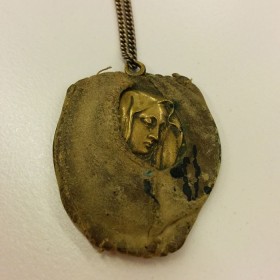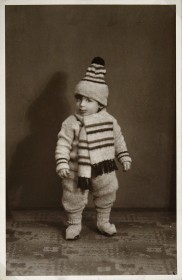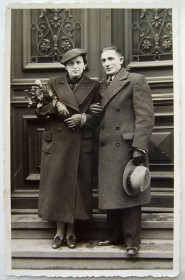An extraordinary gift
Last week, museum benefactor Fred Kranz accepted our invitation to participate in two workshops in our archives. He met with two classes of schoolchildren, one from Döbeln in Saxony and the other from Berlin’s Tegel district. It was the fifth time in recent years that Mr. Kranz – who was born in Berlin in 1938 – came back from the USA to speak to students and their parents about his life. The Kranz family, which consisted of Fred and his parents, survived the war living on a farm that belonged to a former employee of his father, in the village of Kallinchen on Motzener See (Lake Motzen) in Brandenburg.
In 2004, Fred Kranz donated a collection of documents and photographs to the museum that provide an impressive record of Jewish life in the years immediately following the war. During his most recent visit, he gave us a very special – a truly unique – object. Here is the story of this piece, in his words:
The origin of the medallion with the image of the saint
In the autumn of 1942, my parents and I were living in Berlin’s Mitte district at Fehrbelliner Straße 79. I was just four years old and I wanted to run around and play, like other children my age. There was in fact a playground in our neighborhood, in the same place known today as Teutoburger Platz. But Jews were not allowed to use it.
Since my mother wanted, in spite of everything, to get me out into the fresh air, she took the Star of David off of her coat and proceeded with me to the playground. While I played, she sat on a bench and looked on. As she later told me, she maintained an appearance of complete calm and behaved just as the other mothers did, although inwardly she was terrified of being recognized and denounced. I have to say, I never noticed her fear as I played with the other children.
On one of these trips to the playground, a man slowly approached my mother. She became extremely frightened but was careful not to show it. She had the feeling that this was an agent of the Gestapo. The man then passed – very close to her, very slowly, without looking at her or saying hello. And as he went by, without anyone else seeing, he suddenly pressed something into her hand. In those few seconds she heard him utter the Hebrew words “Al tirah avdi Yaakov!” (אל תירא עבדי יעקב) Before my mother could register her shock, the man had disappeared.
It was only when we arrived safely at home that my mother saw – and was astonished by – what the man had slipped to her: it was a medallion with an image of a saint (probably Mary). It hung on a chain and was partly encased in leather. Its worn down face suggested how often it had been used for prayer.
The parents, Hermann and Leonore Kranz, at their civil wedding ceremony. Berlin, 1937 © Jewish Museum Berlin, gift of Fred Kranz
My mother saved the medallion and brought it with her, when we left Berlin in December of 1942 to hide in so-called ‘illegality’ in Brandenburg until the end of the war. I have kept it since her death, and I’m happy now to be able to pass it on to the Jewish Museum Berlin, where it can contribute to the history of how the Jewish people of Berlin were persecuted. For my mother and me, this medallion was always a symbol of hope and of brotherly love despite the horrifying circumstances of that time when it came to us.
As it happens, the Hebrew exclamation that the stranger spoke quietly to my mother in the park came from the Book of the Prophet Jeremiah, Chapter 46, verse 28. It is translated in the English scriptures like this: “Yet do not be afraid, Jacob my servant, for I will save you.”
Fred Kranz
We are very grateful to Fred Kranz for the donation of this remarkable object.
Aubrey Pomerance, head of the archives



Mother Mary will protect all God’s children. Jew’s,Catholic’s all are God’s children. Beautiful story from Fred Kranz.